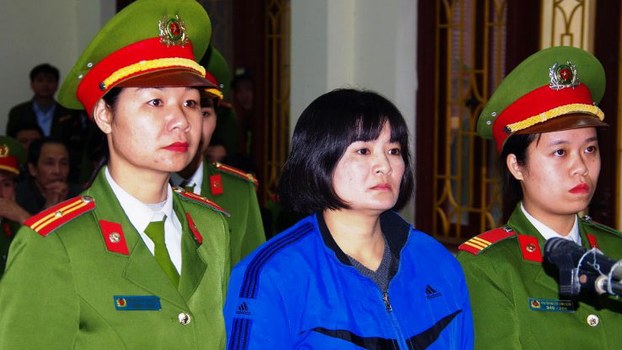




Vietnam responded to the U.S. withdrawal from the Trans-Pacific Partnership (TPP) trade deal with “a renewed crackdown against rights activism” that saw bloggers and activists arrested and sentenced to long prison terms, Human Rights Watch said in annual report on Thursday.
The decision to quit the TPP, one of the first steps taken by President Donald Trump to reverse the policies of predecessor Barack Obama, removed a key incentive for the one-party communist state in Hanoi to care about its image, the New York-based watchdog group said.
“During the TPP negotiations, Vietnamese authorities knew it looked terrible to arrest activists,” said Brad Adams, Asia director.
“But they have dropped their mask since the Trump administration pulled out of the TPP, and started handing out heavy prison sentences to citizens peacefully calling for democracy and an end to one-party rule,” he said.
In its annual report on conditions around the world, Human Rights Watch noted that “basic rights including freedom of speech, assembly, association, movement, and religion remain severely restricted in Vietnam’s one-party state.
“State-sanctioned thugs often attacked dissidents, while police brutality, including deaths in police custody, remains a serious problem,” HRW said.
According to HRW’s tally for Vietnam, at least 24 people were convicted in 2017 for their human rights or democracy writings and advocacy, while in the past 14 months, police arrested at least 28 people for “national security” offenses used to punish critical speech and peaceful activism.
“At least 119 people are currently serving lengthy prison terms for expressing critical views of the government, taking part in peaceful protests, participating in religious groups disapproved of by the authorities, or joining civil or political organizations that the ruling party deems to be threats to its monopoly on power,” HRW said.
The Paris-based Vietnam Committee on Human Rights (VCHR) said in a Jan. 5 report that at least 46 activists were jailed in 2017 “for exercising their rights to freedom of expression and freedom of peaceful assembly,” according to a Jan. 5 statement by the group, which counts at least 130 political prisoners behind bars in Vietnam.
Without responding to the specific assertions by HRW, Vietnamese Ministry of Foreign Affairs (MOFA) spokeswoman Le Thi Thu Hang said on Thursday that “Vietnam rejects the false and non-objective information about the situation in Vietnam.”
“Human rights assurance and promotion are a consistent policy of Vietnam which is implemented in accordance with the Constitution and the laws of Vietnam as well as the international conventions on human rights that Vietnam is party to,” she said at a daily press briefing in Hanoi.
“Vietnam's efforts and achievements in ensuring and promoting human rights have been widely recognized by the international community,” added Hang.
The spokeswoman pointed to a government white paper published on Thursday titled “Protecting and Promoting Human Rights,” Vietnam’s second such paper since 2005.
Former prisoner of conscience Bui Thi Minh Hang, a human rights activist, told RFA’s Vietnamese Service the white paper did not accurately describe his country’s situation.
“The human rights situation in Vietnam is deteriorating while the government keeps lying about it without feeling ashamed. They never take responsibility for their words, and they don’t even understand what they are talking about,” he told RFA.
“Activists have been suffering from constant imprisonment and suppression. I myself have been released from prison but I can’t do anything, not even travel, because they keep troubling me,” added Hang.
“Where are the so-called human rights for them to talk about?”
Reported by RFA's Vietnamese Service. Translated by Emily Peyman. Written in English by Paul Eckert.